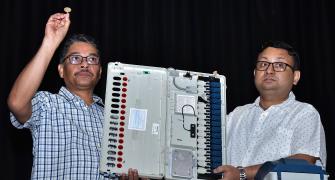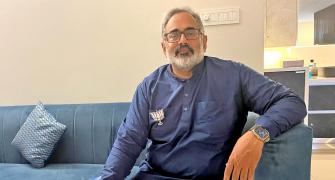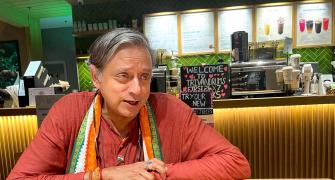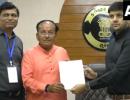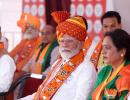Is the unusually and unbearably scorching Sun and the general laxity, bordering on laziness, among voters, responsible, asks N Sathiya Moorthy.
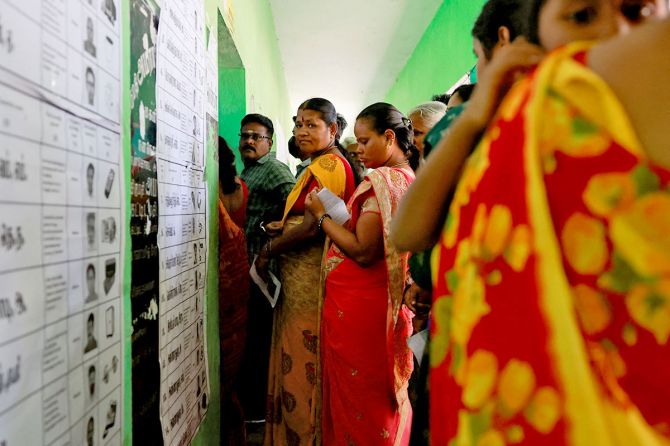
This time, the numbers didn't add up for the Election Commission, or so it seems.
After declaring a state-wide average of 72.09 per cent average polling across Tamil Nadu's 39 Lok Sabha seats at 7 pm on the polling day, April 19, the Election Commission applied midnight corrections, to bring down the figure by around three per cent, to 69.46.
In the previous polls in 2019, it was 72.44 per cent. In the past, such corrections used to give a higher figure for the final turnout.
Officials have since attributed the difference to the approximate figure recorded in the mobile apps of individual polling officials across the state and the final figures when tallied after the dust and din had settled down.
They also explained away the overall lower turnout, especially the discouraging figures in urban centres, starting with capital Chennai, to the unusually and unbearably scorching Sun and also the general laxity, bordering on laziness, among elite and educated voters.
The officials did not say, and obviously so, but it all meant that armchair critics, supporters and opponents of political parties and governments, at the Centre and in the states, continue to leave it at that as has been their wont all along.
The urban voters do not want to buck the trend, as if it were their exclusive right to do so -- and no one should have any issues about it.
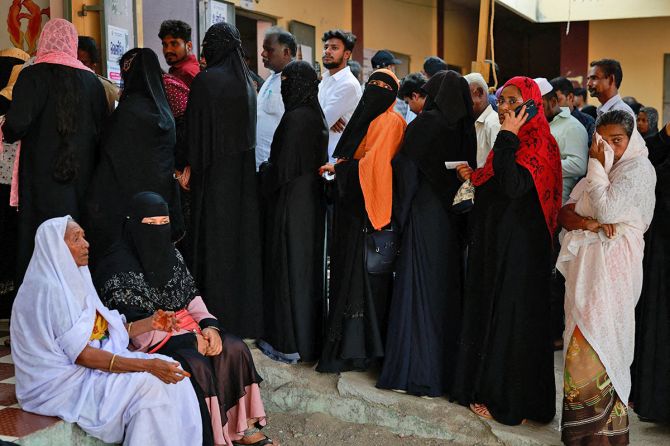
Tamil Nadu was the only medium-sized state in the country where all 39 constituencies voted in the first-phase of polling on April 19.
While complaints remained with political parties and independent candidates -- like three-time chief minister O Panneerselvam, an ally of the ruling BJP-NDA candidate in coastal Ramanathapuram had issues with the minimal campaign time of only 19 days -- other issues like unprecedented summer heat and a tradition of urban laxity bordering on laziness, among others, contributed to lower voter turnout in the three Chennai city constituencies, and a few others.
Rather, low polling has come to define, quixotically, the urban-rural divide in a state that claims to be the most urbanised and urbanising one in the country. Or, so it seems.
Thus, the lower the voter turnout, higher the number of elite voters a constituency can claim to have in its rolls.
Though the same need not always be true of the high turnout constituencies, which anyway have a mix of semi-urban, semi-rural and rural areas.
The official figures announced close to 15 hours after polling ended at 6 pm put the state average at 69.46 per cent.
Dharmapuri constituency, where Sowmya Anbumani, wife of the PMK's Anbumani Ramadoss, an ally of the BJP, is the key contestant, polled the highest 81.48 per cent.
The lowest was at Chennai Central, 53.91 per cent.
In comparison, the supposedly most elitist of all constituencies in the state, adjoining Chennai South, recorded the second lowest 54.27 per cent.
It was one of those prestige fights involving former Telangana governor Tamizhisai Soundararajan (BJP), incumbent DMK member Tamizhachchi Thangapandian and her predecessor, medical-doctor J Jayavardhan, son of party strongman and former minister D Jayakumar, was the AIADMK candidate.
Post facto, the turnout, which was lower even by past history, is attributed to victims across the Velacherry belt boycotting the poll, to register their protest against the indifference of the Centre and state governments to their plight at the height of the unprecedented December cyclone and consequent floods. This needs independent verification.
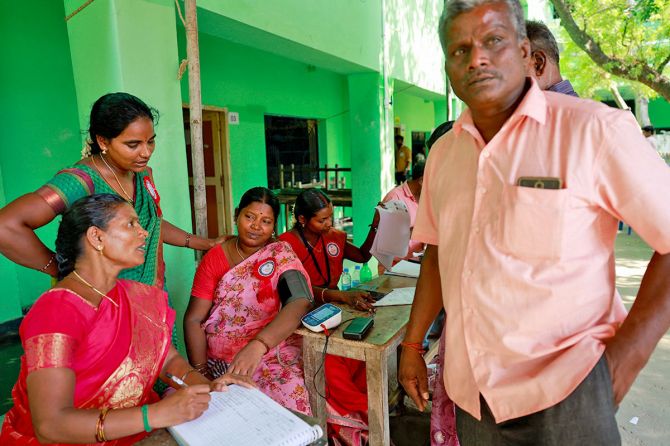
Ironically, the DMK's former Union minister Dayanidhi Maran was seeking re-election from Chennai Central with its lowest turnout, after bagging the seat in 2004, 2009 and 2019, but lost to the ruling AIADMK nominee in the intervening 2014 polls, in which then chief minister J Jayalalithaa's 'Modi-ya, indha Lady-ya?' campaign-call made the difference.
Before 2004, Dayanidhi's late father Murasoli Maran had won the seat in 1998 and 1999.
The lower turnout in Chennai Central can be explained by multiple factors.
Of course, it's the Sun, which read 38 on the thermometer, against the early prediction of 32 degrees -- but the 'real feel' was 46 degrees on polling day.
It was true across the city, so to say. It was the kind of summer heat that Chennaites, rich or poor, had not got used to.
Among them, the former class did not have direct incentives to make it to the polling booths 'in the scorching Sun', as the poor, who seemed to be grateful to their political leaders and governments, whether in the state or at the Centre, for the 'freebies' that were being given to them, all along.
If there were any immediate inducements -- and, irrespective political affiliations and hues, it was there -- it was only an additional motivating factor, so to say.
Yet, all of it does not explain the low turnout, especially in Chennai Central, which has a concentration of upper caste Brahmins and even greater number of north Indian voters, who are settled in the city for generations.
There are also young migrants, both in the IT sector and low-end services industry, who are registered voters in the three city constituencies.
There is a fair share of the latter, in almost every constituency, especially urban and semi-urban.
There are also a substantial number of minority voters, especially Muslims, in Central Chennai.
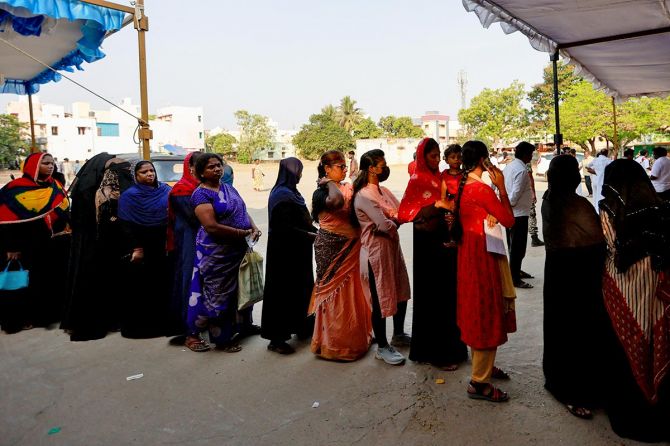
Another factor, which may be indicative of a trend, is that in all three outings that he had won, Dayanidhi Maran seemed to have had an easy way -- and there are apprehensions in the party that he might have taken it easy this time -- against a committed BJP nominee Vinoj P Selvam, who has been seen as a strong field worker since his contesting the 2021 assembly polls from one of the city candidates, only to lose to later-day DMK minister P K Sekar Babu.
The AIADMK had allotted the seat inexplicably to the junior DMDK ally, whose candidate was anyway weak.
Suffice to point out that in the 2009 Lok Sabha polls, AIADMK booth agents were found missing even in the key Stella Maris College after Jayalalithaa and superstar Rajinikanth had cast their votes.
It was a tactic carefully introduced by the AIADMK Opposition all across the state in the key 1999 Lok Sabha polls when the late DMK patriarch M Karunanidhi was chief minister.
There is still another factor, rather two intertwined ones, that lead to low voting in Chennai.
One, parties are believed to enrol 'bogus voters' in ways that electoral officers cannot uncover in their thousands, but are unable to ensure delivery in single-day polling across the state.
Many voters register their names, again an illegal act, in Chennai, where they are employed, and in their home towns and villages.
A long poll-day weekend is an incentive for them to join their families in the villages, where other inducements too may await them.
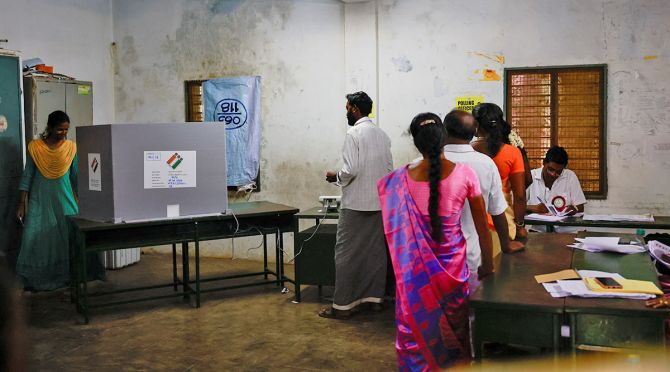
Yet, it is the election day allegation of state BJP president K Annamalai that the names of 100,000 voters had been stuck off the electoral rolls in his Coimbatore constituency that has drawn greater social media attention especially.
He made the observation before noon, with more than six of the total 11 hours of poll-time remaining.
Then he came up with another charge that between them, the DMK and the AIADMK had spent a total of Rs 1,000 crores (Rs 10 billion) to bribe voters.
It's true that not all voters would have been bribed, nor would have all of them accepted it even if offered, but with 21.06 lakh (2.106 million) voters, the per-head-average works out to Rs 4,750 (approximately).
At 71.17 per cent polling, the highest in 20 years, it is over Rs 7,000 per voter.
Leaving aside such mindless calculations, the immediate first question is this: What were Annamalai's BJP-RSS cadres from booth committee upwards doing all these days, at least from the day he was named the candidate?
Even without it, Coimbatore has become a BJP stronghold and a 'traditional party seat' since the 1998 serial blasts, and has a strong cadre-presence, too.
Incidentally, Coimbatore recorded moderate 64.81 per cent polling.
It was the lowest in the western region, where the party has a substantial backing in neighbouring Tiruppur, Erode and Nilgris, too -- but next only to the southern region, where too the average turnout was relatively low in the mid-sixties.
The low poll percentage in Coimbatore is still intriguing, as it was the most watched constituency even for the national media, thanks to Annamalai's candidature and Narendra Modi promoting him more than any other regional satrap sans the chief minister's job.
It owes to the kind of high tension that got built on the candidacy, and Annamalai's own constant declarations about the rival DMK and AIADMK wanting to unleash violence to spoil his chances.
According to some reports, Annamalai's declarations that he would demand re-polling in the constituency only demoralised party workers and supporters elsewhere in the state, too, as the BJP had hoped to win four or five seats in the state.
The list included Annamalai in Coimbatore, Union minister L Murugan (Nilgiris), former Telangana governor Tamizhisai Soundararajan (Chennai South), former Union minister Pon Radhakrishnan (Kanyakumari) and state legislative party leader Nainar Nagendran (Tirunelveli).
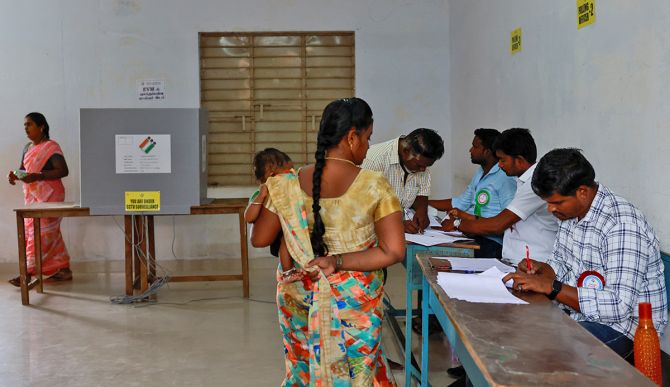
As analysts keep their thumbs crossed on the final outcome, which would be known only weeks later on June 4, parties and leaders will be cocooned in the coming days, analysing their victory chances.
In the process, they will also be washing their dirty linen in public, or at least in private, blaming everyone around, within the party at all levels, for not doing enough, even if they hope to win their respective seats.
In all alliances, especially the ruling DMK-Congress combine, there will be allegations that the alliance partner did not do enough at the grassroots-level.
There will also be charges of senior party leaders, both from constituency and away, trying to torpedo their own party/alliance candidates.
The list could include some DMK ministers, too, some of them seniors and veterans.
All parties, especially DMK boss and chief minister M K Stalin, had warned of stringent action against local party leaders if their candidates fare badly -- even if they won the seat.
The list could again include some seniors in every party -- but what action will be taken, if at all, will be known only after the results are out, both in the state and at the national-level, all on June 4....
N Sathiya Moorthy, veteran journalist and author, is a Chennai-based policy analyst and political commentator.
Photographs curated by Manisha Kotian/Rediff.com
Feature Presentation: Rajesh Alva/Rediff.com

